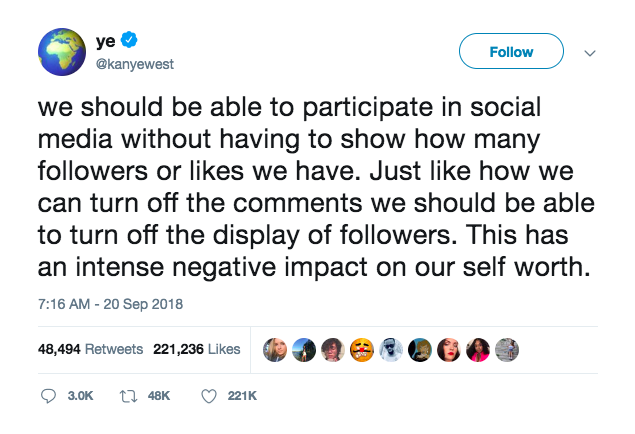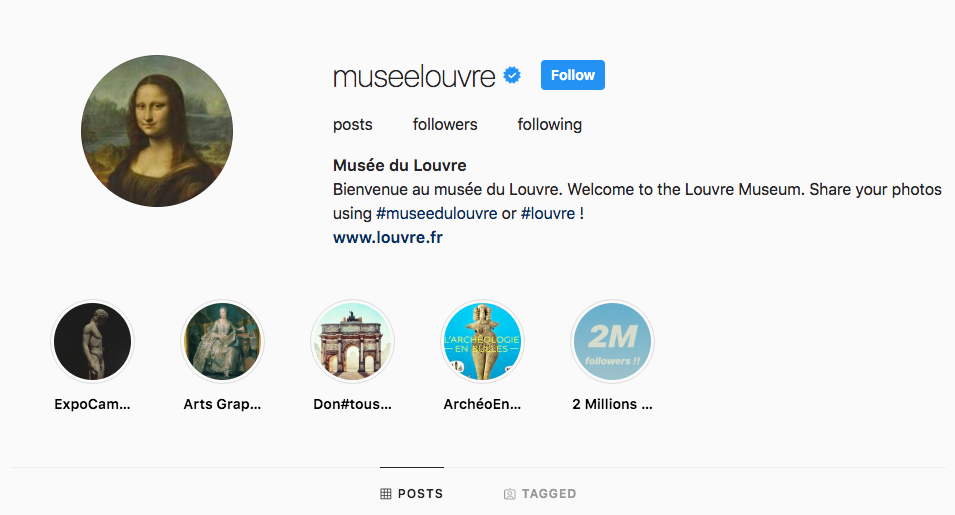I never thought I’d say this, but here we go: I agree with Kanye West. At least about one issue. In late September, the controversial rapper tweeted: “we should be able to participate in social media without having to show how many followers or likes we have. Just like how we can turn off the comments we should be able to turn off the display of followers. This has an intense negative impact on our self worth.”

“I would encourage everyone to remember that how a technological system is designed has dramatic effects on the people who use it. These systems are not neutral. The way that they’re made, the way that they’re designed, changes how we act and interact and how we think about ourselves.”
“Visible metrics are perhaps the most effective way to activate users to pay attention to these platforms. I think this goes back to our evolutionarily developed need for esteem. When we see a number that reports our sociality, that says this many people like you, or this many people paid attention to you… It’s nearly impossible for us to not want that number to be larger. Nobody wants to go around saying ‘nobody liked me’… ‘Nobody paid attention to me’. They want to see that people paid attention and they want that number to get larger.”
“So let’s say you go to a party, you grab some photos at that party, you post those photos online and maybe your friend who went to that party also took some photos and also posts those photos online, and you look at your photos and maybe they got 1 or 2 or 3 likes, and you look at your friends’ photos and they got a lot of likes, they got 50 likes, they got 100 likes. All of a sudden, you feel competitive with your friends. Well wait. ‘Why did they get all these likes and I didn’t? What is it about my photos that aren’t good enough? Why aren’t people paying as much attention to me?’”
Imagine being able to use social media without these anxiety-inducing numbers. Well, you can, thanks to Ben Grosser.
The Realists November Challenge is all about removing metrics from social media and observing how it makes you feel.

The image above shows Ben Grosser’s Facebook Demetricator plugin in action. When activated, it removes all metrics from the platform, simply stating “people liked this” and “view more comments” – instead of “view 3 more comments.”


The photos above show what Instagram looks like after installing the Instagram Demetricator: number of posts, likes, comments, followers, and timestamps are gone.
An important note: Ben Grosser’s Facebook, Twitter and Instagram Demetricators only work on computers (and not tablets or smartphones) because mobile APIs do not allow these kind of modifications. I encourage you to look up his Demetricators and install them on the web browser(s) you use every day.
For instance, if you use Google Chrome, you will have to go to the Chrome Web Store, search for “Demetricator” – and you will find the 3 plugins developed by Ben Grosser for Facebook, Instagram and Twitter. To install any (or all) of them, click on “Add to Chrome” and then click on the button “Add Extension.”
The November Challenge is for any or all 3 of Grosser’s Demetricators. For instance, I deactivated my Facebook account a long time ago, so I will only use it for Instagram and Twitter. It’s up to you to decide which Demetricator to install.
Over the course of the next three weeks, I will check in with you, sharing more insights about the effects of visible metrics, and I will ask you to provide your impressions about what it’s like to use social media without these numbers.
For this challenge, we are partnering with the amazing Renae Regehr and her Canadian organization Free to Be, a program that promotes positive body image and media literacy. Renae and her organization’s members and followers will be participating in the challenge along with us.
Looking forward to the next steps!
– Elena





